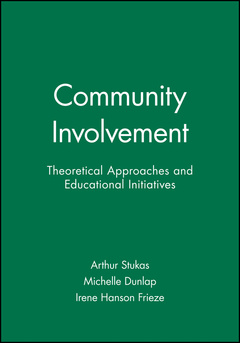Community Involvement Theoretical Approaches and Educational Initiatives Journal of Social Issues Series
Coordonnateurs : Stukas Arthur, Dunlap Michelle, Frieze Irene Hanson

- Presents an overview of the recent history and trends associated with community involvement, including definitions, goals, major movements, and examples of specific models
- Includes discussions of the functions, processes, and theoretical underpinnings of community involvement and specific types of involvement such as community service, service-learning, and volunteerism
- Highlights themes such as education, power relations, and motivation as they emerge from the discussion of community involvement
1. Community Involvement: Theoretical Approaches and Educational Initiatives: Arthur A. Stukas and Michelle R. Dunlap.
Part II: Theoretical Approaches:.
2. Four Motives for Community Involvement: C. Daniel Batson, Nadia Ahmad, and Jo-Ann Tsang.
3. Dispositional and Organizational Influences on Sustained Volunteerism: An Interactionist Perspective: Louis A. Penner.
4. Role as Resource for Action in Public Service: Jane Allyn Piliavin, Jean A. Grube, and Peter L. Callero.
5. Inter-Group Helping Relations as Power Relations: Maintaining or Challenging Social Dominance Between Groups Through Helping: Arie Nadler.
Part III: Educational Initiatives:.
6. Campus-Community Partnerships: The Terms of Engagement: Robert G. Bringle and Julie A. Hatcher.
7. Reflection: Linking Service and Learning-Linking Students and Communities: Janet Eyler.
8. Personal Identity and Civic Responsibility: ‘Rising to the Occasion' Narratives and Generativity in Community Action Student Interns: Jefferson A. Singer, Laura A. King, Melanie C. Green, and Sarah C. Barr.
9. Designing Service-Learning to Empower Students and Community: Jackson Elementary Builds a Nature Study Center: Carol M. Werner, Rose Voce, Kellie Gaufin Openshaw, and Michael Simons.
Part IV: Conclusion:.
10. Community Involvement: Opportunities and Challenges in Socializing Adults to Participate in Society: E. Gil Clary and Mark Snyder.
Part V: 2001 Kurt Lewin Award Address:.
11. Introduction to the 2001 SPSSI Presidential Address: John F. Dovidio.
12. The Costs of Seeking Self-Esteem: Jennifer Crocker.
Michelle R. Dunlap received her Ph.D. from the University of Florida. She is a social psychologist who specializes in social and personality development as an associate professor of human development at Connecticut College. She has served in various professional capacities with the American Association for Higher Education (AAHE), the Association for Women in Psychology (AWP), Campus Compact, the New England Psychological Association (NEPA), and the Society for the Psychological Study of Social Issues (SPSSI). She has written extensively about college students working in urban community settings, intergroup relations, and multicultural child-rearing issues. She is author of Reaching Out to Children and Families: Students Model Effective Community Service, and co-editor of the forthcoming book, Charting a New Course for Feminist Psychology.
Date de parution : 09-2002
Ouvrage de 242 p.
15.2x22.9 cm
Thème de Community Involvement :
Mots-clés :
topic; special issue; drawn; contributors; psychology; involvement; variety; perspectives; overview; community involvement; history; models; specific; set; course; functions; community; underpinnings; types


